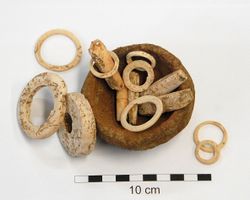
This Lapita jewellery box was uncovered at the Bourewa site in Fiji.
Read more.
The Lapita were a sea-faring people thought to be the ancestors of contemporary populations in Polynesia, Micronesia and some parts of Melanesia. This is an important historical artifact from the past.
Radiocarbon analyses undertaken since the fieldwork at the Bourewa excavation indicates that the earliest occupation occurred between 1260-950 BC, probably around 1100 BC.
Find out more about the: Incredible New Finds from Fiji’s Earliest Settlement.
e-Learning activity summary
Stimulus resources
The Lapita were a sea-faring people thought to be the ancestors of contemporary populations in Polynesia, Micronesia and some parts of Melanesia. This is an important historical artifact from the past.
Radiocarbon analyses undertaken since the fieldwork at the Bourewa excavation indicates that the earliest occupation occurred between 1260-950 BC, probably around 1100 BC.
Find out more about the: Incredible New Finds from Fiji’s Earliest Settlement.
Purpose
Learning outcome actions
Content is available under the
Creative Commons Attribution Share Alike License.
Privacy Policy | Authors